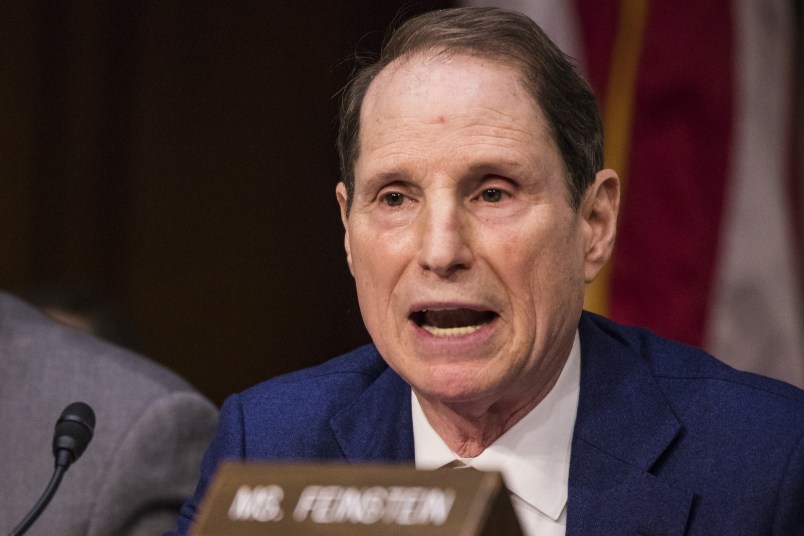A Treasury Department list of wealthy Russian allies of Vladimir Putin appears to have been classified without the involvement of the intelligence community.
The news raises further questions about whether the list needed to be classified in its entirety at all. And it adds to concerns that the Trump administration is finding ways to soft-pedal its enforcement of Russian sanctions to avoid alienating Putin.
At Tuesday’s Senate Intelligence Committee hearing on global threats, Senator Ron Wyden (D-Ore.) asked the five top intelligence chiefs an unusual question, citing “the politicizing of the classification system”: Had any of them taken a position on the Trump administration’s decision to classify a major portion of a report on Russian oligarchs created by the Treasury Department?
Four of the men — FBI director Christopher Wray, Director of National Intelligence Dan Coats, CIA director Mike Pompeo, and DIA director Robert Ashley — answered that they had not. NSA chief Michael Rogers answered: “I raised concerns with the DNI,” but he appeared to be talking about the Nunes memo, a different issue that Wyden had also asked about.
As part of a sanctions law passed by Congress in August in response to Russia’s interference in the 2016 election, the Treasury Department was required to create a report on wealthy Russians closely aligned with Vladimir Putin.
But even as he signed the sanctions bill, President Trump referred to it as “seriously flawed.” And he made a point of saying that the executive branch answered to him, not to Congress.
A day before the January 30 deadline to produce the report, Treasury issued a bare list of Russian billionaires that it acknowledged had been taken from Forbes magazine. Treasury Secretary Stephen Mnuchin said there was a classified annex to the report that Treasury would use to punish oligarchs closely aligned with Putin, per the bill’s mandate. Mnuchin said that could happen as soon as February.
In response, Wyden called for the annex to be declassified and said Mnuchin “isn’t even going through the motions” of following the law.
A spokesman for the Treasury, who asked that his name not be used, declined to comment on the record about the level of involvement of the intelligence community in classifying the annex.
But the spokesman said the annex had been developed with input from the intelligence community. He added that it needed to be fully classified because it “describes specified Russians’ links to corruption, international business affiliations, and other sensitive information,” using “classified sources and methods.”
The department “does not publicly telegraph future sanctions actions,” the spokesman said. “Including a classified annex in the report allows inclusion of highly sensitive classified information. It similarly protects against asset flight by those discussed there.”
John Sipher, a former member of the CIA’s Senior Intelligence Service, the leadership team that guides CIA activities, told TPM the Treasury’s decision to leave the full annex classified without apparent input from the intelligence community struck him as unusual, too.
“I assumed they’d been consulted,” he said of the intel community. “If not, it is very odd.”
I. Charles McCullough III, the inspector general of the intelligence community under President Obama from 2011 to 2017, said it wasn’t unusual in itself for the Treasury to use its classification power without the intelligence community officially being involved. But he said he was surprised to hear the intelligence chiefs say they hadn’t had any heads-up at all.
“Treasury is more involved with intel than people realize; they’re part of the intelligence community with the Office of Foreign Asset Control,” said McCullough, now a partner at D. C. firm Tully Rinckey. But, he continued, “you’d think there would be some coordination at a lower level just to sort of deconflict things. I guarantee if they were declassifying something, there would be communication.”







Wyden is one to watch. IIRC, Wyden asked very pointed questions about spying on Americans that Clapper flat out lied about. He knew he was being lied to at the time and, in hindsight, it was obvious from his follow up questions. So he has experience using an open session to ask questions he already knows the answer to in order to break stories the administration is trying to hide.
If he’s asking questions out of left field I’m inclined to trust that he knows there’s a big issue that’s worth digging into
Well, we seem to have stumbled upon the one thing this administration is doing effectively.
One can only admire Wyden’s doggedness!
Gee, why would the maladministration classify so much of this report? Obviously a mistake that we can now expect to be remedied in short order.
Woof! Woof!